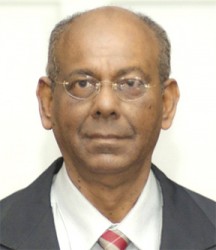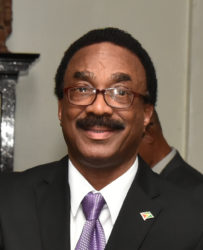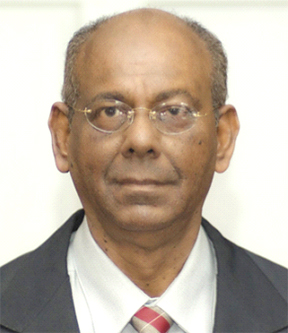It is “unhealthy” for Justice Franklyn Holder’s call for an apology from Attorney General Basil Williams to remain pending, according to Senior Counsel Ralph Ramkarran, who says the issue should now be resolved by them and not the judiciary.
“The judge’s demand for an apology from Mr. Williams still remains on the table and it should be resolved. It is unhealthy for it to remain pending,” Ramkarran told Sunday Stabroek recently.
A verbal exchange between Justice Holder and Williams during a hearing on March 23 resulted in the judge leaving the bench without adjourning the proceedings. He later wrote a report to the acting Chancellor in which he described Williams’ behaviour as “highly contemptuous” and he said he was unprepared to hear him in any case unless he offered an apology in open court to him and members of the Bar, who he said were also scandalized.
Many in the legal fraternity believe that the issue could have been better handled, particularly by the judge, since the exchange occurred in his courtroom. The judge has since recused himself from hearing the case, while saying, among other things, that it had become politicized.

Acting Chancellor Justice Yonette Cummings-Edwards has since said that the matter is now settled, having been handled by the court. “It is a matter for the court to handle and the matter engaged the attention of the judge,” she said before later agreeing that what transpired in the courtroom that day is of concern.
Asked if she was at all concerns about the events which transpired in the courtroom between the two, she responded “of course we are concerned and that is a matter that we have to be concerned about.”
Pressed on her plans to deal with this matter she responded “the matter has been addressed by Justice Holder and in relation to the Attorney General and Justice Holder, the matter was between the two of them and the matter has been addressed….”
Ramkarran, a former Speaker of the National Assembly, told Sunday Stabroek that he did not think that the matter was “settled” but noted that it appears to have been brought to an end with the judge’s decision to recuse himself.

Ramkarran, when asked if the judiciary shouldn’t be dealing with the judge’s report even though he has recused himself, said that the judiciary had no jurisdiction over the matter. “The Chancellor is right—that it’s a matter between the judge and Mr. Williams,” he said.
He said that the matter could have been “better handled all around. Notwithstanding the publishing of the matter by Mr. Nandlall, which hardened positions (but Mr. Nandlall is not at all to be blamed or criticized for that).”
According to Ramkarran a period of reflection, may possibly have resulted in the matter being handled differently, with a more conciliatory outcome.
Recently, former AG Bernard De Santos SC disagreed with Justice Cummings-Edwards’ decision to inform President David Granger of the judge’s report on the case in light of the separation of powers enshrined in the Constitution. “This situation is not a situation which warrants a reference to the President. It is an internal, professional problem which has to be dealt with in a manner prescribed,” he said.
De Santos told this newspaper in an interview that the acting Chancellor might have brought the president into the matter given that the AG is also a minister of the government. “Maybe what the Honourable Chancellor had in mind when she referred the matter to the President was for him to deal with the political aspect, the governmental aspect, after all he appointed Mr Williams… he can sack him,” he said.
However, he maintained that she erred and “diluted a stream” which ought to be preserved, that is, the separation of powers.
No jurisdiction
Meanwhile, former Chancellor Cecil Kennard told Sunday Stabroek that Justice Holder could have dealt with Williams at the time and no other agency has jurisdiction. “The law provides for the judge to deal with the situation as it exists,” he said, before adding that the acting chancellor has no jurisdiction to deal with Williams.
“I don’t know if she can intervene. I don’t think she can decide that… maybe a tribunal should have been set up to investigate seeing that so much time has passed,” he said. Justice Kennard stressed that the judiciary is independent from the executive and therefore the president cannot determine if the AG or the judge was wrong. “It’s the judge who can sanction the AG or another High Court judge can be appointed to hear both sides of the matter,” he said. “The ball was in the judge’s court. I think in the confusion he did not realize he could have acted in the matter right there and then,” he said.
Asked if he believed that the matter is now settled, Justice Kennard responded in the negative. “I don’t know how it was settled….that is not clear. If the AG made a personal private apology then so be it. The matter is in public and all information should be ventilated. The Chancellor should say if there was a private apology,” he said.
He noted that a lot of publicity has been given to the matter and surely the public ought to know what is taking place. “I feel sorry for the judge. Based on what was said, if that is true, I think what Basil [AG] said was out of line and it was disrespect to the judge [but] I was not there,” he added.
Asked what his initial reaction was, Kennard said that he felt the AG “went overboard.” He said that even if it did not amount to contempt, Williams’ behaviour was not respectful to the judge, who controls the court. “It was blown out of proportion and Basil’s behaviour did not help the situation. I would want to know as a member of the reading public how was the matter settled,” he stressed.
Before announcing his decision to recuse himself on May 8, Justice Holder recounted the sequence of events from the previous hearing. Justice Holder said the AG proceeded to make statements which were “insolent and disrespectful in both tone and content.”
The judge said he told Williams that he took umbrage to his tone and his insinuation that the court was being selective in recording evidence.
The judge noted that Williams, in a rather truculent manner, while standing in the well of the court, responded that “the last person who told me what I should not say was a magistrate and he is now dead.”
Following that statement, the judge said, Williams then declared, “all morning Nandlall disrespecting you and you have not done anything about it.” This, the judge asserted, was not a true statement reflective of the proceedings.
Justice Holder emphasized that addressing the court by the use of the pronoun “you, ought to count in any quarter as being disrespectful.”
The judge said that this was followed by “a most egregious statement of Mr Williams, to wit, ‘I could say what I want to say and when I want to say it, I have always been like that,’” which prompted him to rise from the bench and retire to his chambers. Justice Holder said that taken individually, the statements he recounted that were made by Williams “may be perceived as insolent behaviour and not necessarily contempt of court.”
When considered collectively and within the time frame they were made, the judge, however, asserted that the statements prima facie constitute “contemptuous behaviour.”





